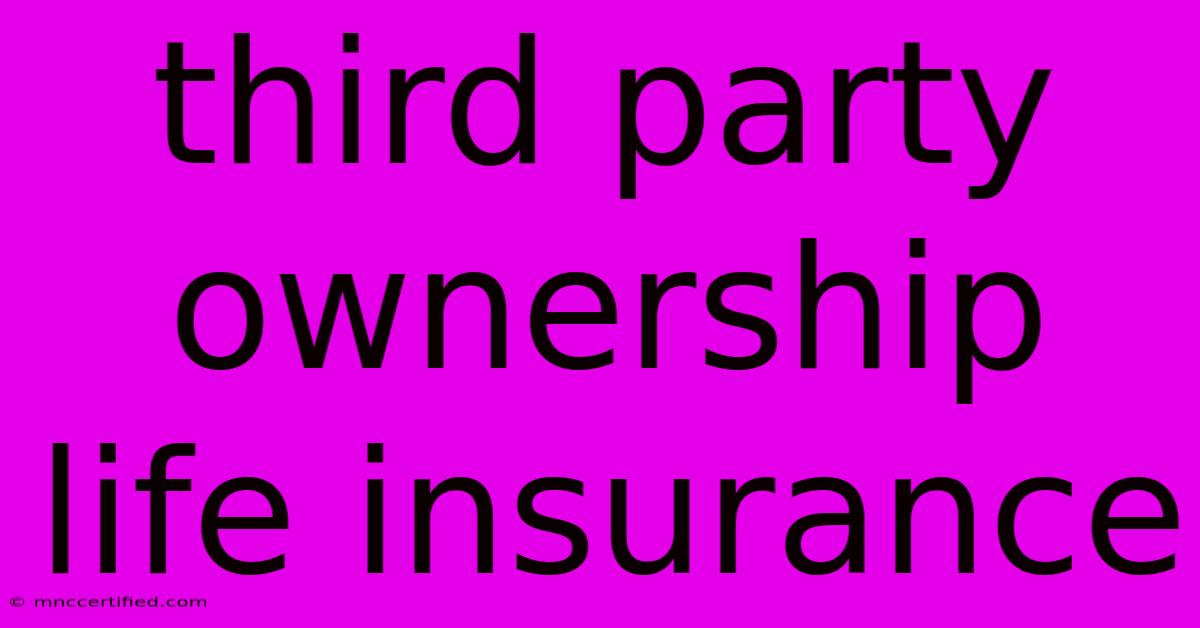Third Party Ownership Life Insurance

Table of Contents
Third-Party Ownership Life Insurance: Understanding the Complexities
Life insurance is a crucial tool for financial security, but the traditional model of individual ownership isn't the only option. Third-party ownership life insurance allows someone other than the insured to own and control the policy, creating a unique dynamic with various applications.
What is Third-Party Ownership Life Insurance?
In this arrangement, an individual or entity, the beneficiary, owns the life insurance policy on another person, the insured. The beneficiary pays the premiums and has complete control over the policy, including its benefits. This differs from standard policies where the insured is the owner and beneficiary.
Why Choose Third-Party Ownership?
Third-party ownership life insurance can be advantageous in several situations, including:
1. Business Purposes:
- Key Person Insurance: Protecting a company's financial stability by insuring the life of a key employee. The company owns the policy, ensuring funds to replace the employee's expertise and contributions in case of death.
- Business Buy-Sell Agreements: Facilitating the smooth transition of ownership in a business partnership upon the death of a partner. The policy provides funds to the surviving partners to buy out the deceased's share, preventing disputes and ensuring business continuity.
2. Family Planning:
- Estate Planning: Parents can use third-party ownership to create life insurance policies for their children, ensuring financial security and covering potential education expenses.
- Gifting: A parent or grandparent can purchase a policy for a child or grandchild, allowing them to control the payout and ensure the funds are used for specific purposes like education or starting a business.
3. Other Scenarios:
- Caregiving: A family member can purchase life insurance on a loved one with a disability or chronic illness, ensuring financial support for their care and well-being.
- Debt Protection: A lender can require a borrower to obtain life insurance with a third-party ownership to protect the loan in case of the borrower's death.
Advantages of Third-Party Ownership:
- Control: The beneficiary holds all control over the policy, including beneficiary changes and death benefit distribution.
- Flexibility: It offers flexibility in planning for various financial needs, including business transitions, estate planning, and caregiving.
- Tax Advantages: In some cases, the death benefit can be tax-free to the beneficiary, depending on the policy structure and individual circumstances.
Considerations and Potential Drawbacks:
- Complexity: The legal and financial implications of third-party ownership can be complex and require careful consideration.
- Potential Abuse: There's a risk of misuse or manipulation, especially in situations involving vulnerable individuals.
- Gift Tax Implications: Gifts made through third-party ownership policies may be subject to gift taxes.
- Limited Access to Loans: Policyholders may have limited access to policy loans compared to individually owned policies.
Important Considerations:
- Legal Compliance: Consult with an insurance attorney to ensure compliance with all relevant laws and regulations.
- Financial Planning: Consult with a qualified financial advisor to assess your specific needs and determine if third-party ownership is the right choice for you.
Conclusion:
Third-party ownership life insurance offers a unique and flexible approach to financial planning. However, its complexities and potential drawbacks require careful consideration and professional guidance. By understanding the intricacies and advantages of this strategy, individuals and businesses can make informed decisions to achieve their financial goals.

Thank you for visiting our website wich cover about Third Party Ownership Life Insurance. We hope the information provided has been useful to you. Feel free to contact us if you have any questions or need further assistance. See you next time and dont miss to bookmark.
Featured Posts
-
Robbie Williams Edinburgh Show Announced
Nov 11, 2024
-
Crane And Rigging Insurance Programs
Nov 11, 2024
-
Bone Shibaswap Price Prediction 2030
Nov 11, 2024
-
Lamine Yamal Injury How Long Will He Be Out
Nov 11, 2024
-
La Liga Live Real Sociedad Vs Barcelona On Eurosport
Nov 11, 2024